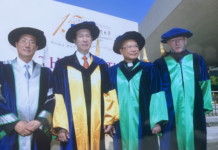IMPACT: JOURNAL OF APPLIED RESEARCH IN WORKPLACE E-LEARNING
A publication of the E-learning Network of Australasia (ElNet)
Call for Papers: Inaugural issue (PDF version available here)
Impact: Journal of Applied Research in Workplace E-learning has been established to address the paucity of research publication avenues with a particular emphasis on e-learning in organisational and workplace settings. It will be a fully online journal, publishing refereed and non-refereed contributions from both researchers and practitioners relating to the design, implementation, evaluation and management of workplace e-learning across a range of sectors and industries.
Submissions are invited for the special, inaugural issue of the journal, the theme of which is “Current issues and future directions in workplace e-learning: Mapping the research landscape”. This issue will include peer-reviewed articles that address one or more of the following areas:
1. Summary and synthesis: Where are we now?
– Identification and analysis of major issues, themes and trends in the field of workplace e-learning research
– Review of key studies and seminal pieces of literature in this field, and how future research efforts might build upon the work already done
2. Gap analysis: What do we need to know more about?
– Discussion of areas have been under-emphasised or neglected in the field of workplace e-learning research
– Exploration of how these areas/gaps might be addressed
3. Planning and designing: How should we move forward?
– Setting the research agenda for workplace e-learning
– Future directions for workplace e-learning research and its application to practice
In addition, case studies / best practice examples and position or commentaryarticles may be submitted to be either peer or editor reviewed. Non-refereed contributions in the form of technical/application notes (eg tools, how-tos) and book/Web site reviews are also invited.
The Editorial Policies section of Impact’s Web site contains general information on the journal’s focus and scope, including topics of interest and types of articles accepted. For specific style guidelines and advice to authors, please see the Submissions section of the site.
Prospective authors for the inaugural issue are strongly encouraged to submit proposals or expressions of interest to the Editor-in-Chief well in advance of the manuscript submission deadline, in order to allow time for feedback and discussion. This may be done via email to impactjournal@elnet.com.au, however full manuscripts are to be submitted via the online submission system on the journal’s Web site, and not via email.
Key dates:
– Manuscript submission deadline: 1 June 2009
– Notification of acceptance: 1 July 2009
– Submission of final articles for publication: 1 August 2009
– Publication of inaugural issue (online): 1 September 2009
Editorial team:
Editor-in-Chief
– Mark J.W. Lee, Charles Sturt University, Australia
President, ElNet
– Clint Smith, Learnworks, Australia
Manager Publications, ElNet
– Position vacant
Manager Branding and Promotion, ElNet
– Marianne Cini, Evolve Studios, Australia
Editorial Board
– A.Y. Al-Zoubi, Princess Sumaya University for Technology, Jordan
– Zane L. Berge, University of Maryland, Baltimore County, United States
– Marcus S. Bowles, Institute for Working Futures, Australia
– John G. Burgoyne, Lancaster University Management School and Henley Business School, United Kingdom
– John Clayton, Waikato Institute of Technology, New Zealand
– Jay Cross, Internet Time Group, United States
– Rabelani Dagada, Wits Business School and Royal Bafokeng Administration, South Africa
– Margaret Driscoll, IBM Global Solutions, United States
– Wellesley R. (“Rob”) Foshay, Texas Instruments, United States
– John G. Hedberg, Macquarie University, Australia
– David H. Jonassen, University of Missouri, United States
– Angela Lewis, Angela Lewis Consulting, Australia
– Kin Chew Lim, SIM University, Singapore
– Joha Louw-Potgieter, University of Cape Town, South Africa
– Terry Marler, Otago Polytechnic, New Zealand
– John G. Mitchell, John Mitchell and Associates, Australia
– Pam Moule, University of the West of England, United Kingdom
– Anna Peachey, The Open University, United Kingdom
– Clark N. Quinn, Quinnovation, United States
– Hanna Risku, Danube University Krems, Austria
– Andrée Roy, Université de Moncton, Canada
– Roderick C. Sims, Capella University, United States
– J. Michael Spector, University of Georgia, United States
– Marcel van der Klink, Open University of the Netherlands, Netherlands
– Jelke van der Pal, National Aerospace Laboratory NLR, Netherlands
– Douglas R. Vogel, City University of Hong Kong, Hong Kong
– David Young, University of Derby, United Kingdom









 Dr. Tony Bates is the author of eleven books in the field of online learning and distance education. He has provided consulting services specializing in training in the planning and management of online learning and distance education, working with over 40 organizations in 25 countries. Tony is a Research Associate with Contact North | Contact Nord, Ontario’s Distance Education & Training Network.
Dr. Tony Bates is the author of eleven books in the field of online learning and distance education. He has provided consulting services specializing in training in the planning and management of online learning and distance education, working with over 40 organizations in 25 countries. Tony is a Research Associate with Contact North | Contact Nord, Ontario’s Distance Education & Training Network.

